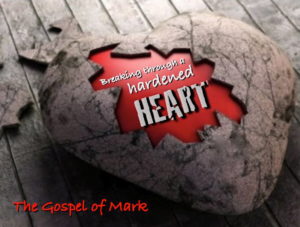[Greek] πωρόω (pōroō), [Latin] caecare, [French] obscurir, [German] blind machen: to petrify, to harden, to blind, to render stupid, to make hard, to make spiritually deaf, to make spiritually blind, to make insensitive, to make callous, to make dull, to have a closed mind, to make dead, to cover with a thick skin; Mk.6:52, Mk.8:17, Jn.12:40, Rom.11:7, 2Cor.3:14, Act.5:3

Background Information:
Secular use: This term is primarily used in medical situations or applications. This occurs when a stone forms in the bladder. In addition, the broken parts of the bone are knitted together. Upon healing, the bone becomes stronger. In some situations, this term means to make one physically or mentally insensitive. It is interesting to note that some translations show the term πωρόω instead of πηρόω, which slightly changes the meaning of this term. Instead of having a closed mind, this term means to wound or cripple. However, these meanings are related in that they affect the sense organs. Involving sight, this means blindness. Involving hearing, this means deafness. Involving the heart, this means hardness of heart. All these qualities become aspects of spiritual incapacity.
Old Testament: Interestingly, this term rarely occurs in the Old Testament. However, these examples do not directly relate to the sense of hardening, but rather with physical deficiencies. Job’s eyes are blind with anguish (Job.17:7). The heart of the wicked is of little worth (Prov.10:20). Despite these warnings, God does not absolve man from personal responsibility. These warnings against hardening oneself takes more prominence in the New Testament. Do not harden your hearts as at Meribah (Psa.95:8).
New Testament: This term essentially means to have a closed mind. It is applied to a broad group of people, including the enemies of the chosen people, Israel itself, Jews opposed to the Christians, and the Christian themselves. This is in the sphere of God’s dealings with His people. In addition, in His Providence, God permits hardening. The Jews are hardened in their opposition to Jesus. The disciples are at times hardened in failing to follow and believe in Jesus. A hardening comes upon Israel.
Scripture:
“When He became aware of this He said to them, ‘Why do you conclude that it is because you have no bread? Do you not yet understand or comprehend? Are your hearts hardened?’” Mk.8:17
The disciples did not understand that Jesus was referring to the Pharisees actions. The disciples also did not understand that Jesus provides true Bread. The disciples forgot the significance of what Jesus did for them at the multiplication of the loaves. The disciples were very clueless.
“’He blinded their eyes and hardened their heart, so that they might not see with their eyes and understand with their heart and be converted, and I would heal them.’” Jn. 12:40
This provides a historical explanation of the disbelief of the Jewish people. This was Isaiah’s Old Testament prophecy that had to be fulfilled. This is a foreshadowing of the disbelief that Jesus encountered. In a sense, God permitted this hardening as part of His divine Providence.
“Rather, their thoughts were rendered dull, for to this present day the same veil remains unlifted when they read the old covenant, because through Christ it is taken away.” 2 Cor. 3:14
This makes reference to Moses veiling his face to prevent him from seeing God’s reflected glory. It is as if the Corinthians were still wearing this veil, clouding their spiritual sight. Their thoughts were clouded by their lack of understanding of what Jesus was trying to present to them. Christ takes this veil away.
Conclusion:
Porous, porosis, caecum, blind
I have had experienced some broken bones in my life. I had always known that my bones had healed. I did not really considered that they could actually become stronger afterward.
I was surprised how infrequently this term is found in the Old Testament. We are all familiar with the term “hardness of heart”, but this is associated with other terms in the Old Testament. Perhaps, this comes from the New Testament understanding of this term, essentially meaning closed minded. At least no one is excluded or immune from God’s command to soften our hearts.
I was intrigued that God allowed (permitted) that the Jews’ hearts be hardened as part of His divine Providence. Perhaps, it was part of His plan for Christianity to spread among the Gentiles throughout the nations. So I guess there will always those some times or situations where it is “hard” to figure out why God does what He does in our lives.
